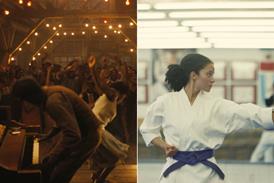Dir: Daniele Cipri and Franco Maresco. Italy. 2003. 100 mins.
The films of Sicilian directing duo Daniele Cipri and Franco Maresco are an acquired taste. If you find physical deformities, speech defects and farting priests funny, you'll love them. The present reviewer was therefore doubled up in fits of laughter through most of their latest effort, The Return Of Cagliostro. Others came out of the Venice press screening muttering about schoolboy sickos with the mother of all Catholic hang-ups.
Distributors would do well to pitch this mockumentary about a short-lived Sicilian film studio at those who like Tod Browning's Freaks, early Monty Python, Hamony Korine's Gummo and the more sacrilegious bits of Fellini's oeuvre. It's a small demographic, admittedly, but an influential one, and with the added bonus of Robert Englund (Freddie Kruger) in the title role, The Return Of Cagliostro may be the first of Cipri and Maresco's films to make more than a subliminal overseas tour, with cult video/DVD afterlife. The ten-minute ovation accorded to the film after its official Controcorrente screening - which included a fair number of paying punters - suggests that Caglisostro may perform better at the domestic box office than anything the duo have done to date. And Cagliostro is unlikely to run into the censorship problems that dogged Cipri and Maresco's previous film, Toto, Who Lived Twice, which featured a character humping a statue of the Madonna.
The fictional story of Trinacria Film Studios, a post-war attempt to set up a kind of mini-Cinecitta in Palermo, is based very loosely on the history of the short-lived Organizzazione Film Siciliana (OFS). But Cipri and Maresco have their own agenda - something that is clear from one of the opening scenes, when bona fide Italian film critic Gregorio Napoli comes across a small flock of scraggy sheep while taking us on a tour of the long-abandoned film studios. He looks at them for a second, then turns to the camera and says "we might take these sheep as a symbol of contemporary Italian cinema" It's a cheap comment, but also an accurate one.
The directors' previous films have all been in black-and-white, a medium which Daniele Cipri (the cinematographer half of the duo) manipulates with a lyricism that contrasts oddly with the often scabrous or scatological subject matter. Cagliostro sees him using colour (both 16mm and cinemascope) for the first time, but black-and-white gets in through the back door via a series of hilarious reconstructions of Trinacria flops - a film about the life of the patron saint of Palermo, Santa Rosalia; or a Sicilian remake of Top Hat with a tap-dancing dwarf.
In between we meet Cardinal Sucato, a foul-mouthed prelate whose antechamber is full of young seminarians dancing cheek to cheek to American swing music (a scene that is funny the first time, but not the third or fourth); we meet the La Marca brothers, whose business is religious statuary but whose dream is cinema; we meet the teeth-gnashing director Pino Grisanti (played, like the cardinal, by the versatile Pietro Giordano). And we meet Erroll Douglas, an American actor in his twilight years, who "like many faded Hollywood stars... was sent to rot in Italy". Robert Englund plays the role with just the right mixture of solemnity and camp.
Cipri and Maresco lack any sense of restraint, and their obsession with physical deformities - however much we decide to read it as a metaphor for the state of Sicily - leaves a bad taste in the mouth. But they are still among the most original filmmakers working in Italy today, and worth an hour and forty minutes of anyone's time.
Prod co: Cinico Cinema
Co prods: Istituto Luce, Rai Cinema, Tele+
Int'l sales: Cinico Cinema
Prod: Giuseppe Bisso
Scr: Daniele Cipri, Franco Maresco
Cinematography: Daniele Cipri
Prod des: Cesare Inzerillo, Nicola Sferruzza
Ed: Fabio Nunziata
Music: Salvatore Bonafede
Main cast: Robert Englund, Luigi Maria Burruano, Franco Scaldati, Pietro Giordano, Davide Marotta, Mauro Spitaleri, Davide Marotta

















No comments yet